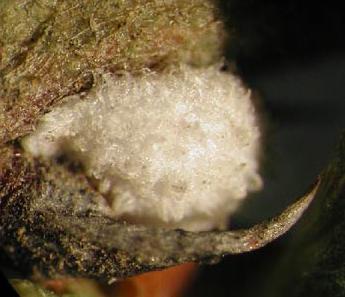 By Judy Scott
By Judy Scott
Oregon State University Extension Office
photo by Robin Rosetta
CORVALLIS, Ore. – A destructive insect called azalea bark scale has been found this spring on azaleas, rhododendrons and Japanese andromeda in Corvallis and Eugene.
“We notice damage when the leaves of plants turn black from the scale honeydew it secretes and small white insects appear on the bark,” said Ross Penhallegon, horticulturist with the Oregon State University Extension Service. “Use a 10x power magnifying glass to identify the insects.”
Scale insects live on bark and stems and have a woolly or cottony appearance. They insert a straw-like mouthpart into plants and suck fluids. They get their name from a waxy coating they secrete that looks like reptilian or fish scales. The white covering is a protectant for the insect.
Other hosts are andromeda, hawthorn, poplar and willow, and most recently the insect has been found infesting blueberries in the Pacific Northwest.
The OSU Pacific Northwest Nursery Integrated Pest Management website notes that: “Overwintering females lay eggs under the scale in the spring. The eggs hatch in the late spring or early summer and the young crawlers disperse and soon settle, mostly in bark crevices and branch crotches, but also onto new growth and leaves.”
Several methods can be used to manage the pests, Penhallegon said.
“Spray horticultural oils during their dormancy, January to March,” he said. “During the crawler stage (late spring to early summer), you can use insecticidal soaps, organic pyretrins or acephate. Scout for dormant stages or crawlers and confirm their presence before spraying.”
For help with identification and management, check with your local OSU Extension office, or call Penhallegon at 541-682-7313.
By: Judy Scott
Source: Ross Penhallegon
Disclaimer: Articles featured on Oregon Report are the creation, responsibility and opinion of the authoring individual or organization which is featured at the top of every article.


